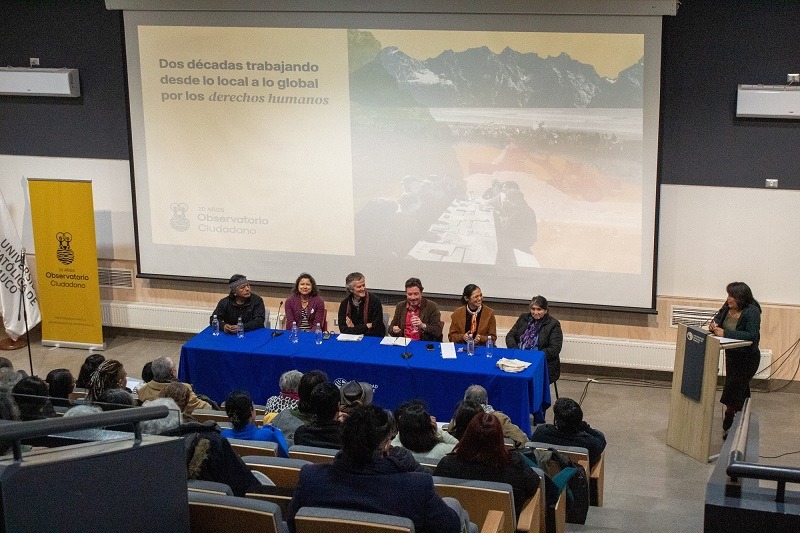9 de marzo de 2017
Mientras los ministros de Comercio de los países del Pacífico se preparan para discutir el futuro de la Asociación Transpacífica (TPP por su sigla en inglés) en Chile la próxima semana, más de 200 organizaciones que representan a los ciudadanos de los países que participarán instan a sus gobiernos a aceptar que el modelo del TPP ha fracasado y participar en un proceso más abierto y democrático para desarrollar alternativas genuinas que confronten los retos económicos, sociales y ambientales del siglo XXI.
Cuando Donald Trump dio aviso oficial del retiro de Estados Unidos del proceso TPP, reconoció lo obvio: que el acuerdo murió bajo el peso de sus propios términos y no pudo obtener suficiente apoyo en el Congreso de Estados Unidos para ser ratificado. Las organizaciones de la sociedad civil unidas a través de los países del TPP habían hecho campaña durante años contra el acuerdo, retrasando su conclusion después de su fecha límite de 2012 y finalmente llevando a su desaparición.
Ahora que el TPP ha muerto, las 200 organizaciones – incluyendo organizaciones internacionales como la Confederación Sindical Internacional (CSI) y Amigos de la Tierra Internacional, así como decenas de organizaciones nacionales de Australia, Canadá, Chile, Colombia, Japón, Malasia, México, Nueva Zelanda, Perú, Corea del Sur, Estados Unidos y Vietnam – creen que los ciudadanos están mejor sin el TPP. Los grupos instan a sus ministros de comercio a resistir cualquier intento de reactivar el TPP mismo o insertar sus reglas en futuras negociaciones comerciales, ya sean bilaterales, regionales o multilaterales.
“Tal como señalamos en su oportunidad, el TPP vulneraba los derechos fundamentales de diversas maneras, incluyendo derechos de propiedad intelectual, derecho a la salud, al medio ambiente, y los derechos de pueblos indígenas, entre otros. También otorgaba derechos a los inversores que deterioraban la capacidad de los estados para asegurar que estos pudiesen garantizar el interés público y la vigencia efectiva de estos derechos,” dijo José Aylwin, abogado y director del Observatorio Ciudadano de Chile. “Por lo mismo rechazamos todo intento de reponer iniciativas análogas, luego de su muerte como consecuencia de la posición del gobierno de Trump en relación a él, con consecuencias adversas similares a los derechos humanos. Lamentamos que el gobierno de Chile tome la iniciativa para convocar a una reunión de los Ministros de Comercio del Pacífico con tal objetivo.”
«Muerto o no, seguiremos vigilando al TPP y cualquier acuerdo de asociación económica basado en el TPP, y lucharemos contra cualquier expansión de la globalización corporativa», dijo Yasuo Kondo de la Acción Popular contra el TPP en Japón.
«Estos ministros están en un estado de negación. En lugar de conspirar para resucitar su modelo fracasado en nuevas formas, deberían comprometerse con su gente para desarrollar alternativas reales que puedan satisfacer las necesidades de sus naciones y reclamar alguna legitimidad genuina «, dijo la profesora Jane Kelsey de la Universidad de Auckland en Nueva Zelanda.
«El TPP fracasó porque puso los derechos corporativos por delante de los derechos de las personas y generó tanta oposición que el parlamento australiano no lo aprobó», dijo la Dra. Patricia Ranald, Coordinadora de la Red Australiana de Comercio Justo e Inversiones. «Desafortunadamente algunos gobiernos, incluyendo Australia – están tratando de revivirlo. Instamos a los ministros de Comercio a no repetir la agenda fracasada del TPP en futuros acuerdos comerciales».
“La amplia oposición pública a través de las fronteras derrotó la toma de poder corporativa del TPP. Cualquier propuesta comercial similar diseñada para beneficiar a las élites corporativas a expensas de las mayorías tendrá el mismo destino,” dijo Arthur Stamoulis, director ejecutivo de la Citizens Trade Campaign, con sede en los Estados Unidos. “Es hora de que los acuerdos comerciales apoyen realmente los empleos bien remunerados, el acceso a la medicina, un medio ambiente sano y los derechos humanos en todo el mundo. Un paso vital es traer la formulación de políticas comerciales a la luz del día e involucrar al público en un proceso transparente del comienzo al fin.»
«El TPP constituía una amenaza para los derechos humanos tanto de las personas que viven en los países negociadores del mismo, como del resto del planeta, al ser proyectado como un modelo ejemplar para el crecimiento del mundo, cuando en realidad contenía disposiciones muy peligrosas en áreas sensibles como la salud, la educación, el acceso al conocimiento y el medio ambiente, entre otras,” dijo Andrea Carolina Reyes Rojas de Misión Salud de Colombia. “Celebramos la caída de este nocivo modelo y urgimos a los países de la Región del Pacífico a asegurar que cualquier negociación comercial que se propongan priorice la protección de los derechos humanos por encima del lucro de actores privados.”
Lea la declaración y vea la lista completa de los signatorios organizacionales.
—————————————————————————————————————————————–
More than 200 organizations over the world demand no reinstatement of TPP in Chile
9 March 2017
For Immediate Release–As trade ministers from across the Pacific rim prepare to discuss the future of the Trans-Pacific Partnership (TPP) in Chile next week, more than 200 organizations representing citizens across the Pacific Rim urged their governments to accept that the TPP model has failed and to engage in a more open and democratic process to develop genuine alternatives that confront the economic, social and environmental challenges of the 21st century.
When Donald Trump gave official notice of the U.S. withdrawal from the TPP process, he acknowledged the obvious: that the deal died under the weight of its own terms and could not achieve sufficient support in the U.S. Congress to be ratified. Civil society organizations united across the TPP countries had campaigned for years against the deal – delaying its conclusion past its 2012 deadline and ultimately leading to its demise.
Now that the TPP is dead, the 200 organizations – including international organizations such as the International Trade Union Confederation (ITUC) and Friends of the Earth International, as well scores of national organizations from Australia, Canada, Chile, Colombia, Japan, Malaysia, Mexico, New Zealand, Peru, South Korea, United States, and Vietnam – believe that citizens are better off without the TPP. The groups urged their trade ministers to resist any attempt to revive the TPP itself or insert its rules into future trade negotiations, whether bilateral, regional or multilateral.
“As we have stated previously, the TPP violated fundamental rights in a variety of ways, including intellectual property rights, the right to health, the environment, and the rights of indigenous peoples, among others. It also granted rights to investors that impaired states’ ability to guarantee the public interest and effectively enforce these rights,” said José Aylwin, a lawyer and director of the Citizens’ Observatory in Chile. “We therefore reject any attempt to recreate similar initiatives after the TPP’s demise in the wake of the Trump administration’s withdrawal, which would have similarly adverse consequences for human rights. We regret that the government of Chile has taken the initiative to convene a Pacific trade ministers’ meeting with such an objective.”
“Dead or not, we will keep watching TPP and any economic partnership agreements (EPAs) based on TPP, and will fight against any expansion of corporate globalization,” said Yasuo Kondo from the People’s Action Against TPP in Japan.
“These ministers are in a state of denial. Instead of plotting to resuscitate their failed model in new forms, they should be engaging with their people to develop real alternatives that can meet their nations’ needs and claim some genuine legitimacy,” said Professor Jane Kelsey from the University of Auckland in New Zealand.
“The TPP failed because it put corporate rights ahead of people’s rights and generated so much opposition that the Australian Parliament has not endorsed it,” said Dr Patricia Ranald, Convener of the Australian Fair Trade and Investment Network. “Unfortunately some governments –including Australia – are trying to revive it. We urge trade ministers not to repeat the TPP’s failed agenda in future trade agreements.”
“Broad public opposition across borders defeated the TPP corporate power grab. Any similar trade proposals designed to benefit corporate elites at the expense of majorities will meet the same fate,” said Arthur Stamoulis, executive director of the U.S.-based Citizens Trade Campaign. “It’s time for trade agreements to actually support good-paying jobs, access to medicine, a healthy environment and human rights around the globe. A vital first step is bringing trade policymaking into the light of day and involving the public in a transparent process from start to finish.”
“The TPP constituted a threat to the human rights for the people living in the negotiating countries and also for the rest of the world, as it was designed as an exemplary model for the global growth, when in fact it contained very dangerous provisions in areas such as health, education, access to knowledge and the environment, among others,” said Andrea Carolina Reyes Rojas of Misión Salud from Colombia. “We welcome the fall of this toxic model and urge the countries of the Pacific region to ensure that any proposed trade negotiations prioritize the protection of human rights over the profit of private actors.”
Read the full letter and list of organizational signatories.


